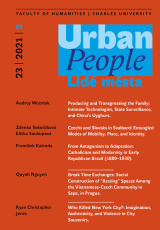From Antagonism to Adaptation
Catholicism and Modernity in Early Republican Brazil (1889–1930)
DOI:
https://doi.org/10.14712/12128112.2369Klíčová slova:
Ultramontanism, Catholic Church, modernity, liberalism, BrazilAbstrakt
This study examines the complex relationship between the Ultramontane Catholic Church and different forms of modernity in the context of the Brazilian First Republic (1889–1930). While the adjective “modern” turned into a discursive weapon to label and reject all kinds of criticized phenomena in Brazilian society (from “modern” literature, arts, theatre, or dances to “modern” – meaning secular – education), the representatives of the Brazilian Ultramontanism fully embraced scientific arguments and the mantle of progress, even adapting to certain aspects of the ideology of modernity promoted by their liberal competitors.
Stahování
Publikováno
Jak citovat
Číslo
Sekce
Licence
Copyright (c) 2022 František Kalenda

Tato práce je licencována pod Mezinárodní licencí Creative Commons Attribution 4.0 .


